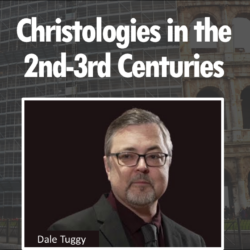Last week Dale Tuggy discussed William Lane Craig’s theory about the Trinity for an hour. In one sense this was a momentous occasion when two heavy-hitting philosophers got into the ring to duke it out. In another sense, the limited constraint of one hour barely gave either much time to warm up or process the other’s position, much less land any serious blows. Still, it was a worthwhile exchange and it has already received over 5,000 views in its first week on YouTube. In this followup interview, I ask Dr. Tuggy about his impression of the exchange, his further thoughts on Craig’s somewhat controversial Trinity theory, and how he would reply if given more time to engage with the “deity of Christ” texts. If you haven’t yet listened to the debate, you can get it on YouTube or if you prefer audio, listen to Tuggy’s Trinities podcast, episode 349.
Listen to this episode on Spotify or Apple Podcasts
—— Links ——
- Here’s the original debate between Dale Tuggy and William Lane Craig on YouTube, on the Trinities podcast
- Check out these other interviews with Dr. Tuggy
- More debates here
- Check out the One God Over All class, which provides you with an introduction to unitarian theology as well as explanations to commonly misunderstood texts.
- Support Restitutio by donating here
- Designate Restitutio as your charity of choice for Amazon purchases
- Join our Restitutio Facebook Group and follow Sean Finnegan on Twitter @RestitutioSF
- Leave a voice message via SpeakPipe with questions or comments and we may play them out on the air
- Intro music: Good Vibes by MBB Attribution-ShareAlike 3.0 Unported (CC BY-SA 3.0) Free Download / Stream: Music promoted by Audio Library.
- Who is Sean Finnegan? Read his bio here







Good discussion, Dale and Sean.
Craig appealed to the Granville-Sharp rule to support his claim that Jesus was being called the god (or “God” as he and most others say) in Titus 2:13. This was because according to the rule, the referents had to be the same. But he ignored the fact that the very same rule invalidated his claim that Jesus was being called the god in John 20:28, because according to the rule, the referents here, had to be be different.
I thought the very personable Dr. William Craig was surprisingly disappointing, and often appeared to be ‘on the back foot’ in his exchanges with Dale. William Craig appealed to ‘Granville Sharp’s rule’ as if it were absolutely decisive in exegeting Titus 2:13 and 1 Peter 1:1, but the astute Trinitarian Greek scholar, Henry Alford, explains in his “Greek Testament Critical Exegetical Commentary” why this is not the case. Alford ascribes the referents ‘God’ in 1 Peter 1:1, and ‘mighty God’ in Titus 2:13, both to the Father alone.
It was sad and surprising to see him appeal to the made up trini Sharp rule, not known before Granville!
The fact is that “the application to Christ of the title theos is exceedingly rare,” according to Dr. Murray Harris in his book Jesus as God.
“It’s a curious fact that each of the [disputed god texts] contains an interpretative problem of some description; actually, most contain 2 or 3.”
“In all strands of the NT, theos generally signifies the Father. Therefore, the word ‘God’ is to be equated with the Father.”
“The fact of the matter is that Paul does not say that there is one God who is both Father and Son; he says rather that there is one God.”
Dr. James McGrath, The Only True God, pp. 38-43.